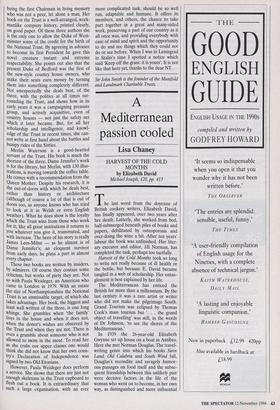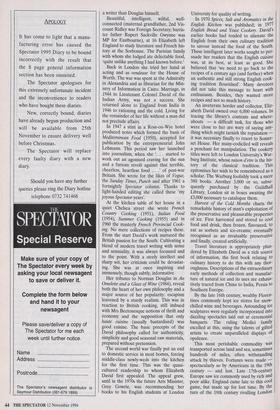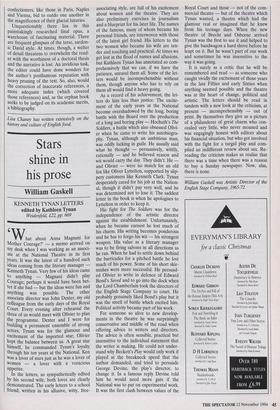A Mediterranean passion cooled
Lisa Chaney
HARVEST OF THE COLD MONTHS by Elizabeth David Michael Joseph, £20, pp. 413 The last word from the doyenne of British cookery writers, Elizabeth David, has finally appeared, over two years after her death. Latterly, she worked from bed, half-submerged beneath piles of books and papers, debilitated by osteoporosis and over-doing the wine a bit. After ten years' labour the book was unfinished. Her liter- ary executor and editor, Jill Norman, has completed the task, perhaps too tactfully.
Harvest of the Cold Months took so long to write not really because of ill health or the bottle, but because E. David became tangled in a web of scholarship. Her entan- glement is best explained by her life.
The Mediterranean has enticed the British for more than a millennium. By the last century it was a rare artist or writer who did not make the pilgrimage South. Grand Tourism was eclipsed by Thomas Cook's mass tourism but `. . . the grand object of travelling' was still, in the words of Dr Johnson, 'to see the shores of the Mediterranean.'
In 1939 the 26-year-old Elizabeth Gwynne set up house on a boat in Antibes. Here she met Norman Douglas. The travel- writing genre into which his books Siren Land, Old Calabria and South Wind fall, Douglas's recondite and savagely humor- ous passages on food itself and the subse- quent friendship between this unlikely pair were decisive factors in the life of the woman who went on to become, in her own way, as distinguished and more influential a writer than Douglas himself.
Beautiful, intelligent, wilful, well- connected (maternal grandfather, 2nd Vis- count Ridley was Foreign Secretary; barris- ter father Rupert Sackville Gwynne was MP for Eastbourne), at 16 Elizabeth left England to study literature and French his- tory at the Sorbonne. The Parisian family with whom she lodged ate delectable food, `quite unlike anything I had known before.'
Back in London she tried her hand at acting and as vendeuse for the House of Worth. The war was spent at the Admiralty in Alexandria and as librarian for the Min- istry of Information in Cairo. Marriage, in 1944 to Lieutenant Colonel David of the Indian Army, was not a success. She returned alone to England from India in 1946 to rationing and the cold. Living for the remainder of her life without a man did not preclude affairs.
In 1947 a stint in a Ross-on-Wye hotel produced notes which formed the basis of Mediterranean Food (1950), accepted for publication by the entrepreneurial John Lehmann. This period saw her launched into journalism, when she `. . . started to work out an agonised craving for the sun and a furious revolt against that terrible, cheerless, heartless food . . .' of post-war Britain. She wrote for the likes of Vogue, the Sunday Times, Punch and after 1961 a fortnightly Spectator column. Thanks to light-handed editing she called these 'my joyous Spectator years'.
At the kitchen table of her house in a quiet Chelsea street she wrote French Country Cooking (1951), Italian Food (1954), Summer Cooking (1955) and in 1960 the masterly French Provincial Cook- ing. No mere collections of recipes these. From the start David's work nurtured the British passion for the South. Cultivating a blend of modern travel writing with sense and sensuality, it was always focussed and to the point. With a steely intellect and sharp wit, her criticism could be devastat- ing. She was at once inspiring and immensely, though subtly, informative.
Her tributes to Norman Douglas in An Omelette and a Glass of Wine (1984), reveal both the heart of her own philosophy and a major source of her popularity: escapism leavened by a sturdy realism. This was in reaction to British cooking, still imbued with Mrs Beetonesque notions of thrift and economy and the supposition that only haute cuisine (usually bastardised) was good cuisine. The basic precepts of the David philosophy called for authenticity, simplicity and good seasonal raw materials, prepared without pretension.
The second world war finally put an end to domestic service in most homes, forcing middle-class newly-weds into the kitchen for the first time. This was the quasi- cultured readership to whom Elizabeth David first appealed. The appeal grew, until in the 1970s the future Arts Minister, Grey Gowrie, was recommending her books to his English students at London University for quality of writing. In 1970 Spices, Salt and Aromatics in the English Kitchen was published; in 1977 English Bread and Yeast Cookery. David's earlier books had tended to alienate the English from their own culinary tradition to savour instead the food of the South. These intelligent later works sought to per- suade her readers that the English cuisine was, at its best, at least as good. She believed that 'we need to go back to the recipes of a century ago (and further) when an authentic and still strong English cook- ing tradition flourished'. Many devotees did not take this message to heart with enthusiasm. Besides, they wanted more recipes and not so much history.
An inveterate border and collector, Eliz- abeth David owned over 6,000 volumes. In tracing the library's contents and where- abouts — a difficult task, for those who were close to her are wary of saying any- thing which might tarnish the reputation — it was necessary finally to resort to Somer- set House. Her many-codiciled will reveals a penchant for manipulation. The cookery titles were left to London University's War- burg Institute, whose raison d'etre is the his- tory of the classical tradition. This epitomises her wish to be remembered as a scholar. The Warburg foolishly took a mere 380 books. Another 3,000 or so, subse- quently purchased by the Guildhall Library, London sit in boxes awaiting the £3,000 necessary to catalogue them.
Harvest of the Cold Months charts the remarkable history of man's exploitation of the preservative and pleasurable properties of ice. First harvested and stored to cool food and drink, then frozen, flavoured, to eat as sorbets and ice-creams; eventually recognised as an invaluable preservative and finally, created artificially.
Travel literature is appropriately plun- dered by Elizabeth David as a rich source of information, the first book relating to culinary history to do this with any thor- oughness. Descriptions of the extraordinary early methods of collection and manufac- ture of natural ice and its uses are exhaus- tively traced from China to India, Persia to Southern Europe.
By the late 16th century, wealthy Floren- tines commonly kept ice stores for snow- chilled wine and beverages. Astounding ice sculptures were regularly incorporated into dazzling spectacles laid out at ceremonial banquets. The ruling Medici familY excelled at this, using the talents of gifted artists to create unparalleled displays of opulence.
This most perishable commodity was transported across land and sea, sometimes hundreds of miles, often withstanding attack by thieves. Fortunes were made spectacularly so by Americans in the 19th century — and lost. Late 17th-century Europe saw ice commonly used by rich and poor alike. England came late to this cool game, but made up for lost time. By the turn of the 18th century rivalling London confectioners, like those in Paris, Naples and Vienna, bid to outdo one another in the magnificence of their glacial luxuries.
Unquestionably there lies in this painstakingly researched final opus, a warehouse of fascinating material. There are frequent glimpses of the terse, sardon- ic David style. At times, though, a welter of detail threatens to overwhelm the read- er with the worthiness of a doctoral thesis and the narrative is lost. An invidious task, the editor could have done wonders for the author's posthumous reputation with heavy pruning of the text. So, also, would the correction of inaccurate references, a more adequate index (which covered those references) and, as the orphan book seeks to be judged on its academic merits, a bibliography.
Lisa Chaney has written extensively on the history and culture of English food.




































































 Previous page
Previous page